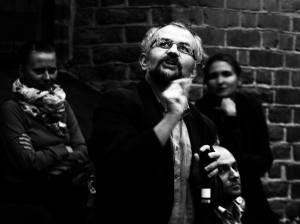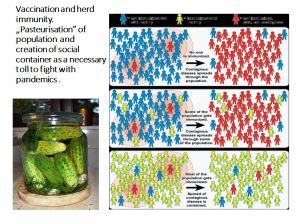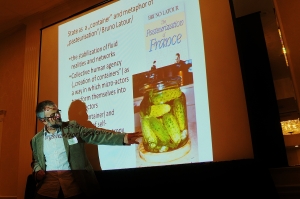Our colleague and friend Andrzej W. Nowak (see him on academia.edu) from Adam Mickiewicz University (Uniwersytet im. Adama Mickiewicza w Poznaniu) in Poznań, Poland, just put a new paper on-line and it deserves some attention.
His new paper “Ontological imagination: Transcending methodological solipsism and the promise of interdisciplinary studies” is available free here. This let’s the cat out of the bag, so to say, but here goes:
To conclude, without phronetic politics, ontological analyses are only an esoteric game, whereas politics and critical reflection are blind without a posthumanist, historical ontology.
Nice, no? If you don’t know Nowak or his work, we have mentioned him on the blog before with regard to our annual 4S meetings. This year, his talk at 4S with the long title “The fragile life of the state and its ambivalence: from the vaccination commando to the anti-vaccination movement. Merging Actor-Network Theory with World-system Analysis” was outstanding. At one point, the crowd was audibly gasping when Nowak discussed the state as akin to a jar of pickles — see the original slide below and then a follow-up slide where he makes the claim (in person) even more forcibly:
At any rate, I will post about presentation as part of a series starting in the new year. So, his new paper. Here is his provocative abstract:
This text is a presentation of the notion of ontological imagination. It constitutes an attempt to merge two traditions: critical sociology and science and technology studies – STS (together with the Actor-Network Theory – ANT). By contrasting these two intellectual traditions, I attempt to bring together: a humanist ethical-political sensitivity and a posthumanist ontological insight. My starting point is the premise that contemporary world needs new social ontology and new critical theory based on it in order to overcome the unconsciously adapted, “slice-based” modernist vision of social ontology. I am convinced that we need new ontological frameworks of the social combined with a research disposition which I refer to as ontological imagination.
Andrzej wants nothing more than to slam together, with so much rhetorical force that they fuse, the likes of C. Wright Mills and Bruno ANT Latour. Do accomplish this, he follows the lead of Flyvberg, stating:
My starting assumption is that one of the problems plaguing the contemporary humanities and social sciences is their isolation from social problems (Flyvbjerg 2001: 166). … Today we know that these fictively-traced boundaries of modernity
cannot be upheld (cf. Beck 1992, Feenberg 2010: 181). The ozone hole, anti-vaccination movements, energy security, terrorism and religious revival do not fit simple modernist frames (cf. Latour 2011).
It initially reminded me of Latour’s Politics of Nature (which I reviewed), but as I read on, I am not so sure. In fact, I am now thinking that perhaps Nowak got it better than Latour did. In the end, Nowak’s “ontological imagination” amounts to this:
The notion of ontological imagination is conceived as multi-faceted, and if one follows Mills and draws and analogy to sociological imagination, at least three main aspects thereof can be listed: methodological, sociological-historical, and moral-political. Let us characterise each of them. The methodological aspect of ontological imagination is, above all, the abandonment of the ideal of science as theory and letting go of the illusions related to humanistic fundamentalism (Abriszewski 2010: 143-157). Using ontological imagination requires noticing the complex network of actors that construct our collective, in accordance with the principle of symmetry, raised by Bruno Latour (Latour 2011). The second aspect consists in the response to the challenge posed by the so-called reflexive modernity and to the fears evoked by technoscience (Nowak 2012). It is the hope that disseminating such sensitivity and cognitive disposition will help to empower groups and individuals in the world of technoscience.
Check out the conclusion for the real push: to be ontologically imaginative will also require us to engage real social problems and perhaps engage in the social change we supposedly only study…
To be, for a moment, critical: The term “ontological imagination” (though sociological in form and function in Andrzej’s use) is not an original term; in fact, this idea has been used elsewhere, for example, in literature, on blogs, in books, and even lectures, often featuring pragmatist thinker William James who, it seems, is not featured in Nowak’s work.



@DMfant
I am not exactly following what is Your point? Is strange for me that You are saying “no” to ontology, and at the same time “yes” to Mol? She is good example of person with “ontological imagination”? Could You elaborate more, what You have in mind?
LikeLike
So there is no room: Andrzej is on a dead-end course to no where? Could I ask: how are you so sure?
LikeLike
yep, saying no to waxing ontological and yes to neo-pragmatists like Stengers, Rabinow, Mol, and Don Ihde, we have to make it up as we go with the actors and resources at hand…
LikeLike
Good luck out there!
LikeLike
I’m not sure I totally follow: are you saying that there is no room for Andrzej’s approach and that the one right direction for the future of STS/ANT is through Stenger’s pragmatism?
LikeLike
as I said in relation to Latour’s unfortunate philosophical turn I think that this is the wrong way to go with what is powerful/effective in STS/ANT (apart from those in the business of updating academic work) and that we should instead follow Stengers’ pragmatist observation that what lab-workers do is to engineer particular and localized assemblages (prototypes if you will) that like all technologies will have to be reassembled/reworked (if not scrapped) for other uses/settings and so should try instead approaches like:
Click to access SB1.0_Rabinow.pdf
LikeLike
Reblogged this on ANTHEM.
LikeLike
Hi, thanks for rewiev. Just short comments. This “ozone hole” sentence, is of course latourian reminder. I am aware that W. James used this term, and I should put reference, I was waiting until I dig through James work, what is still a promising future. I will be back later, when/if disscusion starts.
LikeLike